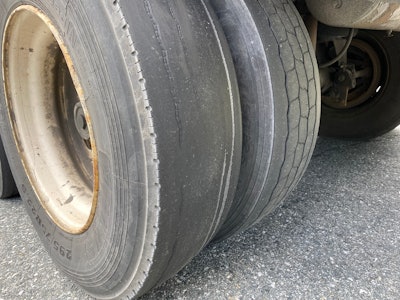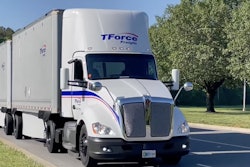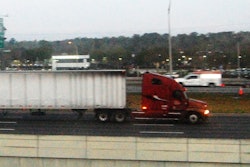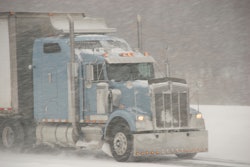
The Commercial Vehicle Safety Alliance’s annual International Roadcheck inspection blitz is scheduled for May 13-15, the organization announced this week.
During the three-day high-visibility, high-volume inspection and compliance enforcement initiative, law enforcement personnel will inspect trucks and drivers at weigh/inspection stations and temporary sites, and with mobile patrols. Data from the 72 hours of International Roadcheck will be collected and results will be released this summer.
Each year, Roadcheck places special emphasis on a driver violation category and a vehicle violation category. This year, those categories will be drivers’ records of duty status (RODS) and vehicles’ tires. To help drivers and motor carriers prepare for this year’s Roadcheck, CVSA created an informational flyer on this year’s focus areas.
[Related: CVSA's out-of-service criteria: New for 2025]
Driver focus: Hours of service recording
To ensure compliance with hours-of-service regulations, drivers must accurately reflect their time and duty statuses in their electronic or paper records/logs. Failure to record, complete or retain the log, or knowingly falsifying logs or other related reports, is not only a driver out-of-service violation, it also makes the driver and/or carrier liable to prosecution.

During the driver portion of an inspection, inspectors check the driver’s documents, CDL, medical examiner’s certificate and skill performance certificate (if applicable), the record of duty status, Drug and Alcohol Clearinghouse status (in the U.S.), seat belt usage, and alcohol and/or drug impairment. If an inspector identifies driver out-of-service violations, they place the driver out of service, restricting that driver from operating their vehicle.
During Roadcheck 2024, hours of service-related violations were the top out-of-service violation category for drivers, accounting for 32.1% of all driver OOS violations. False logs was the No. 4 driver violation, alone accounting for 10.9% of driver OOS violations.
[Related: Man v. machine at roadside: Mitigating rising 'false logs' risk]
Vehicle focus: Tire maintenance in the crosshairs
The importance of proper tire maintenance cannot be overstated. Tire failure while in transit is a hazard to everyone on the road. It's also far more expensive and time-consuming for motor carriers to repair an in-transit tire failure than to proactively maintain tire health and address tire issues before the vehicle is on the road.
During Roadcheck, inspectors will check tires’ tread depth and proper inflation, and will also be on the lookout for tire damage, such as air leaks, tread separation, cuts, bulges, sidewall damage and improper repairs.
Tires were the No. 2 vehicle OOS violation category during Roadcheck 2024, accounting for 20.8% of all vehicle OOS violations during the blitz.
[Related: How to ensure your tires pass roadside DOT inspection]
During the vehicle portion of the Level I Inspection, inspectors ensure the vehicle’s brake systems, cargo securement, coupling devices, driveline/driveshaft components, driver’s seat, fuel and exhaust systems, frames, lighting devices, steering mechanisms, suspensions, tires, wheels, rims, hubs, and windshield wipers are compliant with applicable regulations.
A vehicle that successfully passes a Level I or V Inspection without any critical vehicle inspection item violations may receive a CVSA decal, which is valid for up to three months.
If out-of-service violations are found during an inspection, as outlined in the North American Standard Out-of-Service Criteria, the vehicle is restricted from operating until all out-of-service violations have been properly addressed.
As part of International Roadcheck, inspectors may also be available to answer questions about tire health and violations, and to help drivers navigate the HOS regulations in their jurisdictions; they can vary for intrastate-only operators and some specialized, short-haul or ag operations.
In case of inclement weather or other limiting circumstances during the three days of International Roadcheck, a jurisdiction or an inspector may opt to conduct a limited Level II Walk-Around Driver/Vehicle Inspection or Level III Driver/Credential/Administrative Inspection, instead of a Level I Inspection. Level II and III Inspections are not eligible for a CVSA decal.
[Related: Stay ahead of inspectors with these maintenance topics]










